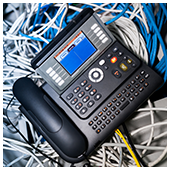 Telephony systems are crucial to business communications and operations and therefore need to be highly secure. Although malware and viruses are some of the most common threats to Voice over Internet Protocol (VoIP) systems, there are other little-known threats too, such as denial-of-service (DoS) attacks. If your business heavily relies on VoIP, you should learn how to protect it from DoS attacks.
Telephony systems are crucial to business communications and operations and therefore need to be highly secure. Although malware and viruses are some of the most common threats to Voice over Internet Protocol (VoIP) systems, there are other little-known threats too, such as denial-of-service (DoS) attacks. If your business heavily relies on VoIP, you should learn how to protect it from DoS attacks.
Denial-of-service attacks
The end goal of any DoS attack is to overwhelm a system with so many requests that it is eventually forced to shut down. Telephony DoS (TDoS) attack is a subcategory leveled at VoIP systems. Alarmingly, this attack is commonly used against hospitals and 911 phone lines. Some TDoS attackers even demand a ransom to halt the attack, which is similar to ransomware attacks. They take advantage of cryptocurrencies and caller-ID spoofing to make it incredibly difficult to identify attackers.
TDoS attacks generally employ fewer resources than the DoS attacks that are designed to cripple IT systems, which include networks, servers, and software. At its most basic, a TDoS attack requires only an automated phone dialer that calls a target phone number and hangs up — over and over. That very simple strategy can stop anyone else from getting through the line.
What organizations need to do
While your first instinct may be to lock down your VoIP system with complicated security measures, doing so will only do more harm than good. Most businesses can’t operate if they can’t communicate with their customers, business partners, and other third parties.
Although VoIP may be a digital resource similar to other components within your IT systems, the very nature of phone lines makes hiding them behind firewalls and other protections impossible. Fortunately, there are now new security protocols that can protect your communication infrastructure against those who try to use force to gain access to your directory information. These protocols can also identify, reroute, and filter calls coming from known attackers. Get in touch with our team to learn more about these protocols.
If you’re experiencing any abnormalities with your VoIP system, or if you want to deploy the most advanced solution that the market has to offer, our expert team of IT professionals is ready to help you at the drop of a hat — just call today.
